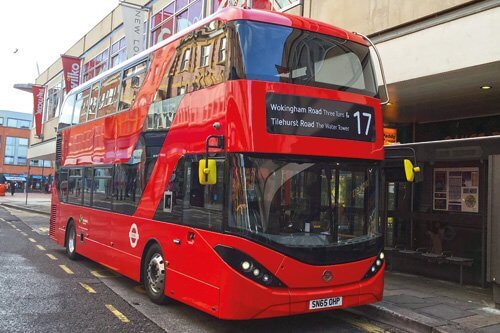 Two drivetrains and a TfL-specification double-decker are being trialled on purple route 17.
Two drivetrains and a TfL-specification double-decker are being trialled on purple route 17.
Reading Buses is currently trialing different vehicles and propulsion systems on its purple 17 route between Wokingham Road, Three Tuns and Tilehurst Water Tower.
The cross town route, which operates 24/7 up to every seven minutes, is Reading’s most popular bus route.
A blue and silver Plaxton President-bodied Volvo B7TL has been testing a new type of electric-hybrid powertrain from a partnership between Vantage Power and Ensignbus (CBW1249). Martijn Gilbert, Reading Buses CEO, told CBW that the powertrain is what is on trial here, as Reading Buses is assessing it for a possible retrofit into its existing Alexander Dennis (ADL) Enviro400 hybrids. This could allow them to operate on pure electric mode in the town centre zone.
An electric ADL Enviro400 with a Compressed Natural Gas (CNG) engine as a range extender, developed by Magtec, is also undergoing trials.
The third vehicle, a red ADL Enviro400 City from London, is currently in use to test the benefits of dual-door operation, whereby separate exit and entrance doors are provided to allow both boarding and alighting at the same time.
The operator said it hopes this will help speed up bus journeys and reduce the time spent waiting at stops.
Martijn Gilbert said: “Dual-door operation has been commonplace and popular in London for many years and as door and step safety systems have improved, we are now seeing other town and city regions such as Brighton and Oxford return to these types of buses for some of their busiest routes.
“With increasing congestion and demand for travel, we’ve got to look at all possible ways of reducing journey times to keep our network moving. The dual door bus trial will give us the opportunity to test this.”
Later next month, the company will also be trialing a higher capacity double-decker bus to see if utilising bigger buses to accommodate growing demand is a viable alternative.
Martijn added: “Should we adopt dual door buses on the route in the future, we will need to work with highways colleagues at the council to re-visit bus stop arrangements, especially raised kerbs.
“Whatever we do, our customers can be assured that we are putting a lot of thought into getting everyone’s views to obtain the best buses for Reading.”
The company plans to replace its fleet of 16 double-decker buses currently on the route with new vehicles towards the end of next year.
Order to depot in six months
According to Ashraf, the lead time from the date of the order to delivery to the customer is approximately six months, which includes transit times and a PDI (Pre-Delivery Inspection).
“Shipping from Egypt is not a problem. There are regular lines from Alexandria to Portbury or Southampton. There are an average of three to four vessels per month on a regular schedule. Transit time is 12 to 13 days,” explained Ashraf.
“Vehicles arrive in the UK from Egypt already fitted with an 18-camera CCTV system, iBus, Mix Telematics, advert frames, TfL’s induction loop system and the fire suppression (a customer choice of two systems). Vinyls, both internal and external are already fitted in Egypt, including fleet numbers. All these were traditionally done in the UK.”
Grant Crisp, Product Support Manager took up the story: “Upon arrival in the UK, which is typically Portbury (Bristol), a ‘belt and braces’ safety check is completed. One of our drivers then drives the bus up to our local Volvo dealer here in Ely, where a roadworthiness check is carried out on areas which include lights, tyres and panels. All that, including the PDI typically takes a day.
“We pick up the bus from there, and bring it here, where final checks are carried on the vehicle – that’s another day’s work. The process includes CCTV commissioning, fitting number plates topping-up fluids such as coolant and fuel, along with any customer adaptations. There are a surprising number of notices on-board. The vehicles don’t come to Ely to be finished – part of the Volvo process is they have to have a PDI upon arrival in the UK.
“In short, it typically takes three days for a bus go from the docks to the customer. It’s a well-oiled system.
“We enjoy an excellent relationship with the Volvo Ely dealership. We’re both very flexible – we do the work at each other’s sites, according to requirements.”
Grant stressed: “Vehicles come here as finished. Before a bus leaves the factory in Egypt, it goes through a thorough check – the factory is ISO9001-compliant.
“As a bus is produced, it is accompanied by documentation, which we call a TFR (Technical Feedback Report). Any comments, failures or defects arising at any point is captured and fed back to our quality department and action taken.
“A prime example is that on the inaugural batch of 20 buses to Go-Ahead London, the iBus access panel was reported early on as being awkward to access owing to the type of latches fitted. After it was reported back, the mechanism was modified to improve reliability.
“The electrical access panel was also modified in response to feedback from Go South Coast.
“Our double-decker is a relatively new product. Every operator is a driver, and everyone’s a vehicle designer. Some people prefer bolts, others screws – everybody is right. There are a lot of passionate people in this industry, who have years of experience. We like to pride ourselves on listening to customers and acting on feedback.”
Ashraf agreed: “Our level of repeat business gives a strong message to the market. In addition to a not insignificant presence among independent operators, we’re proud of our presence within the fleets of Go-Ahead Group, EYMS and London-based Golden Tours which operates 40 MCVs, including Euro 5 and Euro 6, both closed top and sightseeing buses.”

